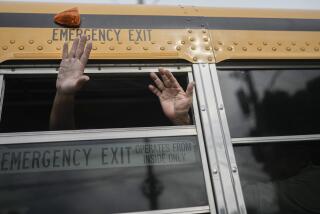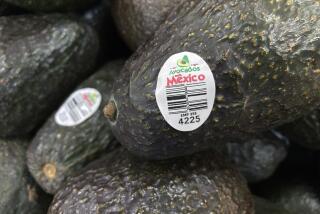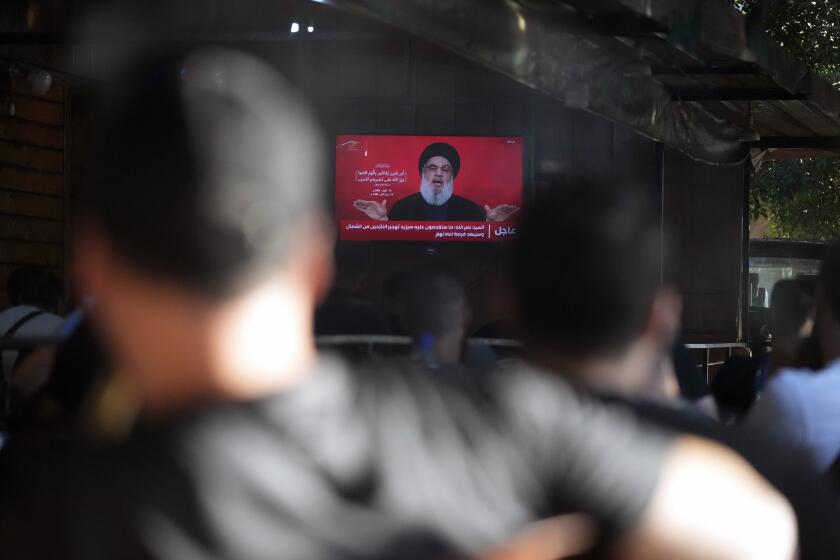U.S. Weighs Curbs Against Nicaragua : Reagan Seeks Ways to Boost Pressure on Sandinistas; Trade May Be Cut Off
President Reagan on Friday ordered Secretary of State George P. Shultz and national security adviser Robert C. McFarlane to undertake an immediate review of the “full family of measures” that could help the United States put more pressure on Nicaragua’s leftist government.
White House spokesman Larry Speakes said that the review will take several days, probably including meetings of national security officials this weekend, and will include “political, economic and other” measures that the Administration might use to support the rebels, known as contras , fighting the Managua regime.
Shortly after the policy review was announced, a State Department official who asked not to be identified, told The Times that the Administration is moving toward economic sanctions, probably a cutoff of U.S.-Nicaragua trade.
Move Opposed
Until now, the State Department has opposed such a move on grounds that a trade embargo would enable the Marxist-led Sandinista government to blame the United States for Nicaragua’s economic troubles and would provide Managua with a propaganda weapon.
But influential members of Congress, including Sens. David Durenberger (R-Minn.), chairman of the Senate Intelligence Committee, Sam Nunn (D-Ga.) and Lloyd Bentsen (D-Tex.), have urged such a step, arguing that the United States thus would not be relying solely upon the contras to pressure the Sandinistas.
Although Speakes’ reference to “other” measures, besides political and economic sanctions, raised the question of potential military options, he ruled that out, declaring, “I wouldn’t raise that scare tactic.”
The review began at the State Department with a meeting of the Interagency Group on Central America, headed by Langhorne A. Motley, assistant secretary of state for inter-American affairs. It was also attended by representatives of the National Security Council, the CIA and the Defense Department.
Speakes said that the review--coming in the aftermath of Congress’ rejection of the Administration’s request for $14 million in aid to the contras--will be used to search for new ways in which the United States might influence events in Central America’s largest nation.
‘Influence Behavior’
“The goal of the policy review,” Speakes said, “is to influence the behavior of the Nicaraguan government, to influence the situation in Nicaragua, to achieve our policy goals there of a free society where they are ready to have free elections. . . .”
At first, he said that one possibility before national security officials was to seek private assistance for the rebels. But he later corrected himself to say that the study would include only possible steps that might be taken by the government.
There have been rumors in recent days that a friendly Asian country might be asked to come to the contras’ aid, but the State Department assured Sen. Christopher J. Dodd (D-Conn.) on Thursday that no such tactic is under consideration.
Even before the House spurned the controversial aid request earlier this week, the Administration had been contemplating further ways to bolster the insurgency against the Sandinistas and had considered options ranging from withdrawing U.S. diplomats from Managua to the imposition of some form of naval quarantine.
The vote, coming after two weeks of intensive maneuvering between Administration officials and Congress, caused Shultz to liken the situation in Nicaragua to Vietnam as he told State Department employees that the contras are fighting “to save the people of Nicaragua from the fate of the people of Cuba, of South Vietnam, Cambodia and Laos.”
On Friday, Speakes told reporters that Reagan is in full agreement with the secretary’s analysis and the grave tone of his remarks.
Ortega Visits Moscow
A new House vote, Speakes said, might tip in favor of the Administration because it has now been disclosed that Nicaraguan leader Daniel Ortega has left for a visit to the Soviet Union and that the Nicaraguan government received another shipment of Soviet helicopters on the same day that U.S. aid to the contras was being voted down in Congress.
Since the vote last Tuesday, a State Department official said late Friday, the Administration has received assurances from several moderate Democrats that they would switch and vote for aid to the contras if the issue comes up again.
“The battle in Congress is not finished,” the official said. “There will be another vote this year, as soon as a vehicle turns up.”
Although Speakes said that the review will be carried out over a period of several days, officials said there is little likelihood that any decision on economic sanctions will be made until Reagan and Shultz return from the economic summit meeting in Europe next month.
Despite the conflict between Washington and the Sandinistas, the United States is still Nicaragua’s largest trading partner. Last year, the United States imported $57-million worth of Nicaraguan goods, including beef, bananas, coffee and shellfish, while it exported $111.5-million worth of American goods, including insecticides, tractors, farm equipment and soybean oil.
More to Read
Sign up for Essential California
The most important California stories and recommendations in your inbox every morning.
You may occasionally receive promotional content from the Los Angeles Times.











